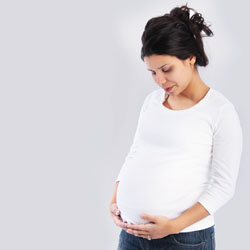Atypical Antipsychotic Drug Aripiprazole Appropriate for Pregnancies
 A 2017 systematic review in the Journal of Affective Disorders found that the atypical antipsychotic medication apripiprazole (Abilify) was relatively safe for use during pregnancy and lactation. Researcher Alessandro Cuomo and colleagues reviewed 93 articles from the last two decades of research.
A 2017 systematic review in the Journal of Affective Disorders found that the atypical antipsychotic medication apripiprazole (Abilify) was relatively safe for use during pregnancy and lactation. Researcher Alessandro Cuomo and colleagues reviewed 93 articles from the last two decades of research.
Placebo-controlled research on medications used during pregnancy are uncommon, due to ethical reservations about assigning women randomly to each group when their fetus may be affected. However, Cuomo and colleagues were able to find some large prospective studies and large database studies that shed light on aripiprazole’s safety during pregnancy. They concluded that the data on aripiprazole during pregnancy and breastfeeding were “relatively reassuring” and that the benefits of aripiprazole outweigh the potential risks.
Risks of relapse upon discontinuing a mood stabilizer can be as high as 80%. Illness in the mother conveys risks to the fetus, so the risk-benefit ratio may suggest that staying on effective aripiprazole treatment during pregnancy and lactation makes sense for many patients.
In a comment on the study reported by Reuters Health, Dr. Jennifer L. Payne of the Johns Hopkins School of Medicine said, “The main reason to discontinue aripiprazole for pregnancy…would be if it is not working and the mother is actively ill, or if she insisted on doing so. In my mind, the literature supports the use of aripiprazole during pregnancy in mothers with serious mental illness who are responding well to the medication.”
Management of Unipolar and Bipolar Depression During Pregnancy
 At the Maryland Psychiatric Research Society’s continuing medical education conference in November, Lauren Osbourne, Assistant Director of the Women’s Mood Disorders Clinic at Johns Hopkins Hospital, gave a presentation on the management of mood and anxiety during pregnancy and lactation. She had a number of important ideas for physicians and patients to consider in their decision-making process.
At the Maryland Psychiatric Research Society’s continuing medical education conference in November, Lauren Osbourne, Assistant Director of the Women’s Mood Disorders Clinic at Johns Hopkins Hospital, gave a presentation on the management of mood and anxiety during pregnancy and lactation. She had a number of important ideas for physicians and patients to consider in their decision-making process.
According to Osbourne, 60%-70% of pregnant women with unipolar depression who discontinue their antidepressants relapse. Of those with bipolar disorder who discontinue their mood stabilizers, 85% relapse, while 37% of those who stay on their medications relapse.
Something to consider when deciding whether to continue medication while pregnant is that depression in pregnancy carries its own risks for the fetus. These include preterm delivery, low birth weight, poor muscle tone, hypoactivity, increased cortisol, poor reflexes, and increased incidence of attention deficit hyperactivity disorder (ADHD) and other behavioral disorders.
The placenta makes an enzyme 11-BHSD2 that lowers the stress hormone cortisol in the baby. However, this enzyme is less active in depression, exposing the fetus to higher levels of cortisol.
Thus, the decision about whether to continue medications during pregnancy should consider the risks to the fetus of both the mother’s depression and the mother’s medications.
Most antidepressants are now considered safe during pregnancy. There have been reports of potential problems, but these data are often confounded by the fact that women with more severe depression are more likely to require antidepressants, along with other risk variables such as smoking or late delivery (after 42 weeks). When these are accounted for by using matched controls, the apparent risks of certain antidepressants are no longer significant. This includes no increased risk of persistent pulmonary hypertension, autism, or cardiac malformations.
There may be a possible increased risk of Neonatal Adaption Syndrome (NAS) in the first weeks of life in babies who were exposed to selective serotonin reuptake inhibitor (SSRI) antidepressants in the third trimester. This syndrome presumably results from antidepressant withdrawal, and can include respiratory distress, temperature changes, decreased feeding, jitteriness/irritability, floppiness or rigidity, hypoglycemia, and jaundice. There is not yet a robust literature on the syndrome, but Osbourne suggested that it disappears within 2 weeks of birth.
In her practice, Osbourne prefers to prescribe sertraline, which has the best safety data, along with fluoxetine. Sertraline is also OK for breastfeeding. There is less data on bupropion, but it also appears to be safe during pregnancy. Endocrine and enzyme changes in pregnancy typically cause a 40% to 50% decrease in concentrations of antidepressants, so doses of antidepressants typically must be increased in order to maintain their effectiveness.
Osbourne ranked mood stabilizers for bipolar disorder, from safest to most worrisome. Lamotrigine is safest. There is no evidence linking it to birth defects, but higher doses are required because of increased clearance during pregnancy. Lithium is next safest. There are cardiac risks for one in 1,200 patients, but these can be monitored. Carbamazepine is third safest. One percent of babies exposed to carbamazepine will develop spina bifida or craniofacial abnormalities. Valproate is least safe during pregnancy. Seven to ten percent of babies exposed to valproate will develop neural tube defects, other malformations, or developmental delay, with a mean decrease of 9 IQ points. The atypical antipsychotics all appear safe so far.
Alternatives and Adjuncts to Medications in Pregnancy
Mothers Who Were Abused in Childhood Secrete Less Oxytocin While Breastfeeding
A recent study suggests that women who experienced moderate or severe abuse in childhood secrete less oxytocin while breastfeeding their own children. Oxytocin is a hormone that promotes emotional bonding. The study included 53 women. They breastfed their newborn children while blood samples were collected from the women via IV. Those women with a history of moderate or severe abuse (emotional, physical, or sexual) or neglect (emotional or physical) had lower measures of oxytocin in their blood during breastfeeding than women with no history or abuse in childhood or a history of mild abuse.
A history of abuse or neglect was more common among women with current depression compared to women with a history of depression or anxiety. Women who had never experienced depression or anxiety were least likely to have a history of abuse or neglect.
The study by Alison Steube and colleagues, presented at the 2016 meeting of the Society of Biological Psychiatry, suggests that traumatic events that occur during childhood may have long-lasting effects. These experiences may modulate the secretion of oxytocin in adulthood. Low oxytocin has been linked to depression.
Treating Women During Pregnancy and Breastfeeding
A Danish working group has released guidelines for prescribing psychotropic drugs to women who are pregnant or breastfeeding. After a comprehensive review of the literature, researchers from several different Danish medical societies reported that sertraline and citalopram are the first choice among selective serotonin reuptake inhibitors (SSRIs) for depression in women who are pregnant or breastfeeding. The working group suggested that women with bipolar disorder who need a mood stabilizer because of frequent relapses could be prescribed lithium, though lithium use is associated with a small risk of cardiac abnormalities in the child. Lamotrigine may also be used, and has not been associated with any congenital abnormalities.
Valproate and carbamazepine are not recommended for use during pregnancy and breastfeeding. Use of valproate among women of child-bearing age should particularly be avoided due to several risks for the potential child. These include spina bifida and other serious congenital problems, but also severe developmental delay and loss of about 9 IQ points. Other possible treatments for bipolar disorder and schizophrenia in pregnant and breastfeeding women include olanzapine, risperidone, quetiapine, and clozapine. The data about the safety of these medications are not extensive.
The working group included members of the Danish Psychiatric Society, the Danish Society of Obstetrics and Gynecology, the Danish Paediatric Society, and the Danish Society of Clinical Pharmacology. The recommendations may be found in an article by E.R. Larsen and colleagues in a 2015 supplement to the journal Acta Psychiatrica Scandinavica.



